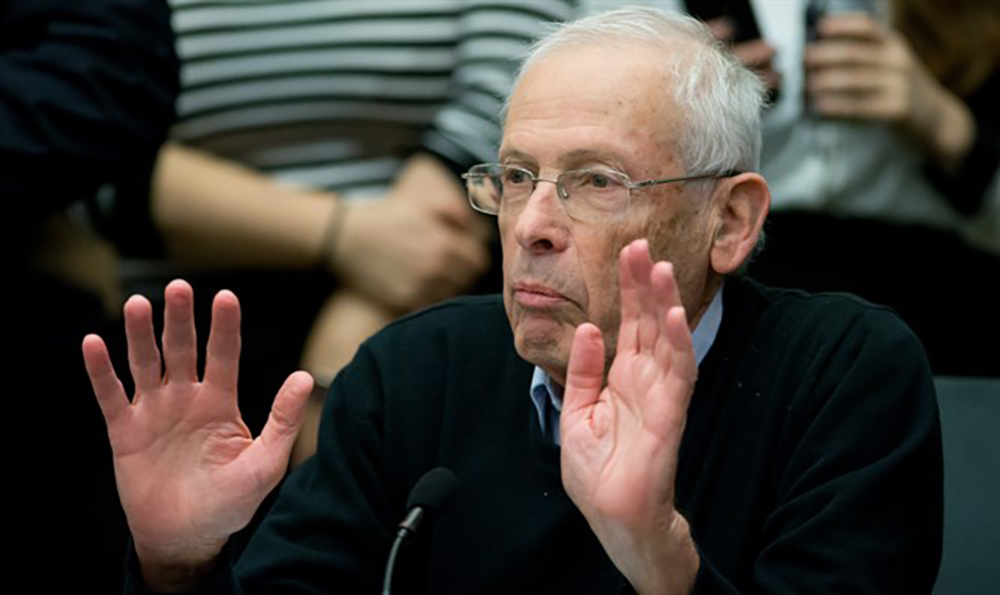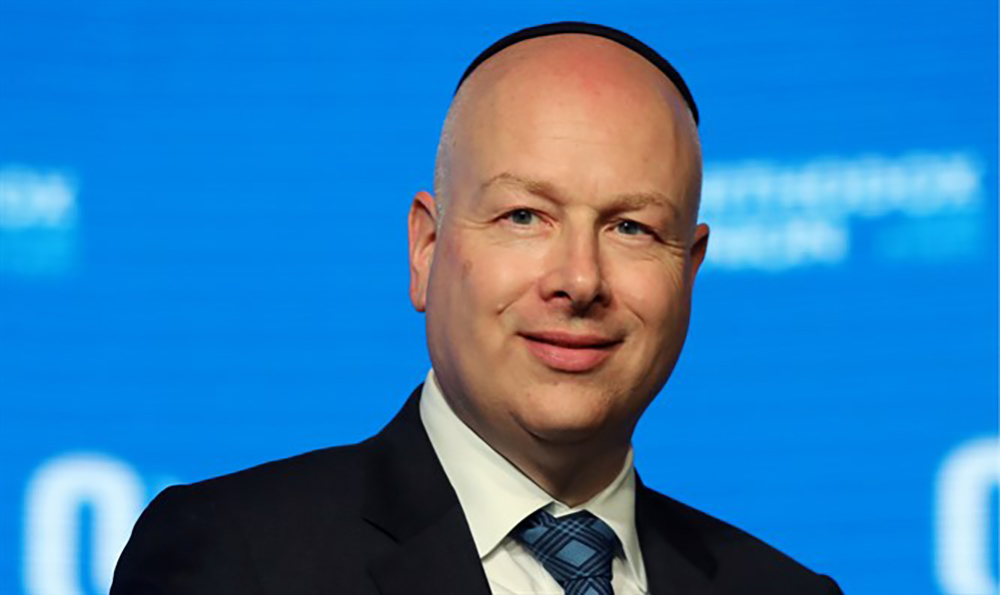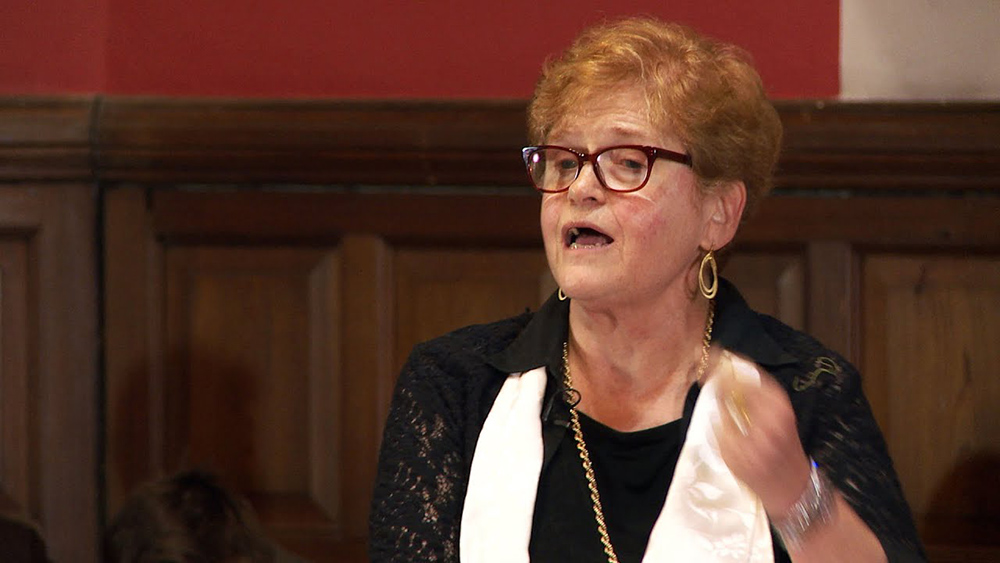By: Zahava Rosenheim
It’s not every day that the chief U.S. envoy for Israeli-Palestinian negotiations publicly denounces an op-ed by the leader of a small American Zionist organization.
But the author of that op-ed doesn’t mind at all.
Moshe Phillips, director of the U.S. division of Herut North America, says that the public debate into which he has been drawn by American Mideast negotiator Jason Greenblatt represents “a healthy airing of serious issues that American supporters of Israel need to consider.”
Phillips is all about airing serious issues. In recent months, the activist has repeatedly stirred controversy with a series of blunt op-eds in the Israeli and American media that have propelled Herut USA from the margins into the big leagues of the American Zionist world.
Herut was the political party that Menachem Begin created when he first emerged from the Jewish underground and ran for the Knesset in 1949. In the 1960s, it expanded to become “Gahal,” and in the 1970s it expanded further and became “Likud.”
The territorial and other concessions that Likud made in response to American pressure disappointed a core group of its longtime supporters. In 1999, Likud activists led by then-Knesset Members Benny Begin and Michael Kleiner left the party and started a new faction using the Herut name.

Until recently, Herut’s activities in the United States were not well known. But that’s starting to change.
QUESTIONING TRUMP’S “DEAL”
Right-of-center American Zionists have lavished praise on the Trump administration’s policies toward Israel. Phillips and Herut have praised many of those policies, too. But while other groups on the right have said little or nothing about Trump’s forthcoming Israel-Palestinian peace plan, Phillips is openly skeptical about some recently-leaked aspects of the plan.

In a July 19 op-ed on the Israeli news site Arutz 7, Phillips challenged Greenblatt’s proposal to establish a land corridor between Hamas-run Gaza and the Palestinian Authority-ruled parts of Judea-Samaria.
“Such a land corridor, slicing across Israel’s middle, would connect and thereby significantly strengthen two hostile anti-Israel regimes,” Phillips wrote.
Noting that Hamas has used Israeli medical treatment permits as a way of smuggling terrorists into Israel, Phillips argued: “If Hamas is already taking advantage of every current opportunity to send terrorists from Gaza to Judea-Samaria, just imagine what it would do if it is given a highway and railway across which it could send whatever it wants.”
“If Hamas starts sending camouflaged truckloads of missiles across the corridor, will American inspectors be on hand to intervene?,” Phillips asked. “Would the war-weary American public accept the stationing of US personnel in such a dangerous situation?”
Phillips was just hoping to stir some discussion. “The corridor issue is extremely important, and nobody in the American Zionist community has been talking about it,” he told the Jewish Voice. “I just wanted to stir some debate.”
The Herut leader got much more than he bargained for. The same day that the op-ed appear, it triggered a rejoinder from Greenblatt himself.
“This op-ed got it wrong & only used 1/2 my quote,” Greenblatt declared in a tweet. He criticized Phillips for not quoting his statement that such a corridor “can only be a part of a comprehensive deal if it is acceptable to Israel & all security issues can be thoroughly addressed.”
Phillips was not impressed by Greenblatt’s complaint. Responding in a second op-ed for Arutz 7, Phillips said that U.S. officials have a long history of pressuring Israel into making concessions and then declaring that the concessions were “acceptable to Israel.”

As examples, Phillips pointed to Henry Kissinger pressuring Israel to refrain from a pre-emptive strike in the 1973 war and to give parts of Sinai in 1975, Jimmy Carter’s pressure for an Israel retreat from southern Lebanon in 1978, and Barack Obama’s pressure that brought about Israel’s freeze on Jewish construction in Judea-Samaria in 2009-2010.
“We all hope it will be different this time,” Phillips concluded. “But when we hear Jason Greenblatt using the same kind of language and arguments that Kissinger, Carter, and Obama used to undermine Israel, we have reason to worry.”
Greenblatt has not yet responded.
HONORING KISSINGER
Phillips’ mention of Kissinger was no accident. He’s had Kissinger on his mind a lot in recent days.
In a recent op-ed in the Jerusalem Post, Phillips criticized the Jewish Leadership Conference, a conservative think tank in New York, for choosing Kissinger as the featured speaker for its upcoming conference.
Citing accounts by Kissinger’s biographer, Walter Isaacson, and then-Jerusalem Post reporter David Makovsky (who was later an Obama Mideast adviser), Phillips wrote that Kissinger pressured Israel not to strike first in the Yom Kippur War, and the engineered the week-long delay in sending U.S. arms to the Jewish state.
Kissinger told colleagues that he wanted Israel to get “a little bloodied” so that it would be more willing to make territorial concessions after the war. To which Phillips responded: “A ‘little bloodied’? Try 2,656 dead Israeli soldiers.”
Phillips also reminded readers of the 1974 White House tape recording, released in 2010, which revealed Kissinger advising President Richard Nixon that the persecution of Soviet Jewry “is not an American concern,” and even “if they put Jews into gas chambers in the Soviet Union, it is not an American concern.”
Kissinger also told Nixon it was “traitorous” for American Jews to try to link US trade to Soviet concessions on Jewish emigration.
“Henry Kissinger is responsible for causing grave damage to Israel and Soviet Jewry,” Phillips asserted. “He does not deserve the honor of being the featured speaker at Jewish communal events. The Jewish Leadership Conference should withdraw the invitation before it permanently tars its own good name and reputation.”
The Phillips op-ed has been widely quoted by Jewish bloggers and other pundits. The Jewish Leadership Conference has not publicly commented on the controversy.
PULLING NO PUNCHES
The sharp-tongued Phillips is earning a reputation among American Zionists as somebody who is willing to address topics that others are reluctant to tackle.
After the shooting attacks on Jews in Pittsburgh and Southern California, Phillips wrote that American Zionists should be talking about Aliya to Israel as a response to arising antisemitism in the United States.
“I am not proposing that the Jews of Beverly Hills and Boro Park should be selling their houses and buying their plane tickets,” he asserted. “All I am saying is that we should at least be…discussing both the positive and negative reasons for moving to Israel. We should be frank about the reasons we give our children for why we love Israel but live here. We should have a serious discussion about what traditional Jewish sources say about the subject.”
Phillips also recently took on historian Deborah Lipstadt. The Emory University scholar publicly criticized Israel’s leaders for “giving cover to” and “sleeping with” the governments of Poland, Hungary, and Lithuania, “who have rewritten the history of their countries’ role in the Holocaust.”

The Herut leader said that while he agrees with Lipstadt regarding those regimes, she is employing a “double standard” by failing to likewise criticize Mahmoud Abbas, whose attitudes regarding the Holocaust are even worse.
“Those European governments are Holocaust-distorters, but Abbas is an actual Holocaust-denier,” Phillips told the Jewish Voice. “Yet Lipstadt has never called for America or Israel to end their relations with him.”
In his 1982 doctoral dissertation, Abbas wrote that only several hundred thousand Jews died at the hands of Nazis, and they were the victims of a secret collaboration between Hitler and David Ben-Gurion.
A FORGOTTEN VICTIM OF TERRORISM
Phillips, a Pennsylvania business executive, is also busy with an issue closer to home: justice for a Philadelphia woman who was murdered by Palestinian Arab terrorists.
Rita Levine, a well-known Philadelphia attorney, was murdered in an attack on an Israeli bus in 1989. The Islamic Jihad terrorist who carried out the attack, Abdel Hadi Ghneim, was released in a prisoner exchange, and the masterminds of the attack have never been apprehended.
The State Department maintains a “Rewards for Justice” program that offers monetary rewards for information leading to the capture of terrorists who have harmed Americans around the world. But Palestinian attacks were not included.
Fifteen years ago, following complaints by the Zionist Organization of America and other groups, the State Department announced that it would include American victims of Palestinian Arab terrorism in the rewards program.
Since then, however, the State Department rewards website has listed only a handful of the nearly 150 victims of Palestinian terror. Now Herut USA is taking up the cause. In a recent op-ed, Phillips blasted State for not including the Levine case, and Herut activists recently collected hundreds of signatures on their “Justice for Rita” petition at a local community event.
“People were coming over to our table all day long, to express their shock that other Jewish organizations have not been pushing for justice for Rita,” Phillips said. “We will fill that vacuum.”
TEST AT THE BALLOT BOX
Will Herut USA’s new high profile translate into votes at the ballot box?
Early next year, American Zionists will cast their ballots for delegates to the 2020 World Zionist Congress. In the previous election, in 2015, Herut won enough votes for just one seat.
Herut’s share of the vote is likely to increase this time around, although just how much it will rise remains to be seen. Phillips and his colleagues will face competition on the right from several older, more established Zionist groups.
Phillips doesn’t mind being the new kid on the block. “Today’s Herut represents a fresh young face in the American Zionist movement,” he says. “We say things that others are afraid to say, and we raise ideas that the Jewish community needs to hear.”





We welcome Mr. Phillips’ concerns about a corridor between Gaza and Judea/Samaria which slices Israel in two. However, it is not true that no one has spoken about this issue.
In fact, as soon as the administration’s economic plan was published, the Zionist Organization of America (ZOA) wrote at length about the MANY dangers of the administration’s economic plan, including the corridor. For instance, in ZOA’s detailed press release entitled “ZOA’s Concerns About $50 Billion “Peace to Prosperity” Plan for Palestinian-Arabs,” available on the ZOA.org website ZOA wrote:
“The “Peace to Prosperity” plan to build a highway and/or rail corridor from Gaza to the West Bank (Judea/Samaria), and other transportation infrastructure, at a cost of over $5.562 billion (See plan p. 27) and $6.562 billion in total “transportation and mobility costs” (Plan p. 11), creates a massive security risk, cuts Israel in two and usurps and displaces Israeli-owned land, home and farms. Such a corridor would enable Hamas terrorists, other terror operatives and their weapons to spread death and destruction.”
ZOA also pointed out numerous other specific dangers of the administration’s economic plan. See https://zoa.org/2019/06/10408269-zoas-concerns-about-50-billion-peace-to-prosperity-plan-for-palestinian-arabs/ ,
ZOA looks forward to receiving the votes of every persons who wants a strong, consistent fighter for Israel’s rights and the Jewish people at the World Zionist Congress.